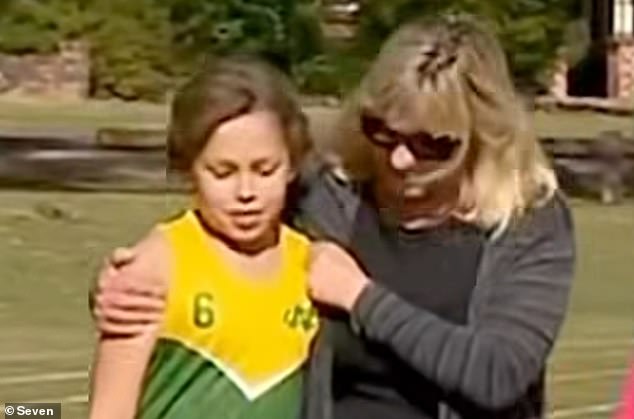[ad_1]
A 10-year-old boy with autism, Charlie Cox, has been excluded from the NSW Primary School Cross Country Championships.
Despite qualifying for the state finals as a special needs athlete, the NSW Education Department ruled him ineligible to compete.
The decision has sparked scrutiny of the state’s athletics guidelines for students with disabilities.
‘We were very disappointed that Charlie was excluded,’ his father Owen Cox told Channel Seven.
‘We are hoping that there’s some type of intervention from the government. Fingers crossed things can change.’
The number of autistic Australians rose by 41.8 per cent from 2018 to 2022, reaching 290,900 people or 1.1 per cent of the population, according to the Australian Bureau of Statistics.

Charlie Cox (pictured with his mother) has been blocked from competing in the North Coast Cross Country Championships in NSW

Cox (pictured) is not allowed to run because the NSW Government has no classification for athletes with autism
Autism Spectrum Disorder (ASD) is a developmental condition that affects how a person communicates, interacts, and experiences the world.
It is recognised as a disability in Australia under the National Disability Insurance Scheme (NDIS); however, funding is restricted to only the more severe cases on the spectrum.
Because autism is a spectrum, not every case is the same.
While some children may be impacted by developmental delays or issues with motor skills, sensory processing, social interactions, and cognitive functions, others thrive in sport with appropriate support and accommodations.
NBA player Tony Snell, NFL defender Joe Barksdale and Major League Baseball star Jim Eisenreich are some high-profile autistic athletes who have competed at the highest level.
The spectrum is what has made it challenging to create an autism category.
‘As such, the inclusion of an autism category for the sports of athletics and cross country are not feasible in the Representative School Sport Pathway,’ the NSW Department of Education told Charlie’s family.
‘There are no nationally recognised benchmarks to support fair and consistent result calculation.

Former NBA star Tony Snell is one of many elite athletes who have been diagnosed with autism
‘Other states and territories that have made local provisions for participation do so outside the formal School Sport Australia pathway and there is no fair or consistent result calculation, nor is there a pathway to the next level of representation.
‘Your concern is acknowledged and please be reassured that the NSW Department of Education remains committed to advocating for broader inclusion through national sporting bodies such as Athletics Australia.’
‘He is so keen [to run],’ his mother Sasha told Radio 2GB host Ben Fordham.
‘He keeps asking, ‘Do I get to run? Do I get to run?”
‘It’s heartbreaking when you have to tell him we don’t know, we have to wait and see.
‘But I try and digress him [to] possibly take up tennis next year, so I am already prepping him for that.’
Fordham said he was surprised there is no category for ASD children given the rapid rise in Australians with the condition.
‘That would make common sense, wouldn’t it?’ Sasha responded.

Ben Fordham questioned the NSW government’s classification system on his 2GB radio show
‘But unfortunately it hasn’t gone that way and it’s not really inclusive for autistic athletes in athletics.’
Fordham asked Sasha what competing meant to her son.
‘He is so proud of himself. Just the pride and the self awareness and being able to encourage him to go further,’ she said.
‘It’s really helped him as a person to grow and adapt.
‘Intellectual abilities are allowed to compete.
‘The fellas he was running up against will be participating there on Wednesday, so yes, they’re included.
‘But not Charlie, not autism, unfortunately.’
Fordham said that it appeared that Athletics Australia had put Charlie’s case in the ‘too hard’ basket.
‘Is it too much to organise?’ Sasha asked.
‘Maybe they need to speak to other bodies and see how they administer their policies in including autism and categorising them.
‘I’m not too sure, but there has to be something that can be done, surely.’
Charlie has received plenty of support, with a large number of Aussies claiming his exclusion was discrimination.
‘He won the race and qualified to go further, but because he has autism he is disqualified from competing? What a joke, he has autism, he is not from another planet,’ one commented.
‘He has earned the right to run, just let him run,’ another said.
Others pointed out that because of the autism spectrum it was not as simple as creating an ASD classification.
‘I’m autistic, I get what they are saying. It’s too much of a spectrum they haven’t nailed down yet,’ one Aussie posted on social media.
Many commenters were united in the belief that Charlie should be allowed to run, not just excluded because there is no classification for him.
‘Just because there arent any classifications for different disabilities doesn’t mean they should exclude,’ one follower posted.
‘It is terrible that he can’t compete because their [sic] is no classification for autistic athletes in the but why can he not just compete in the ‘able body class’ with everyone else?’ asked another.
[ad_2]
This article was originally published by a www.dailymail.co.uk . Read the Original article here. .

